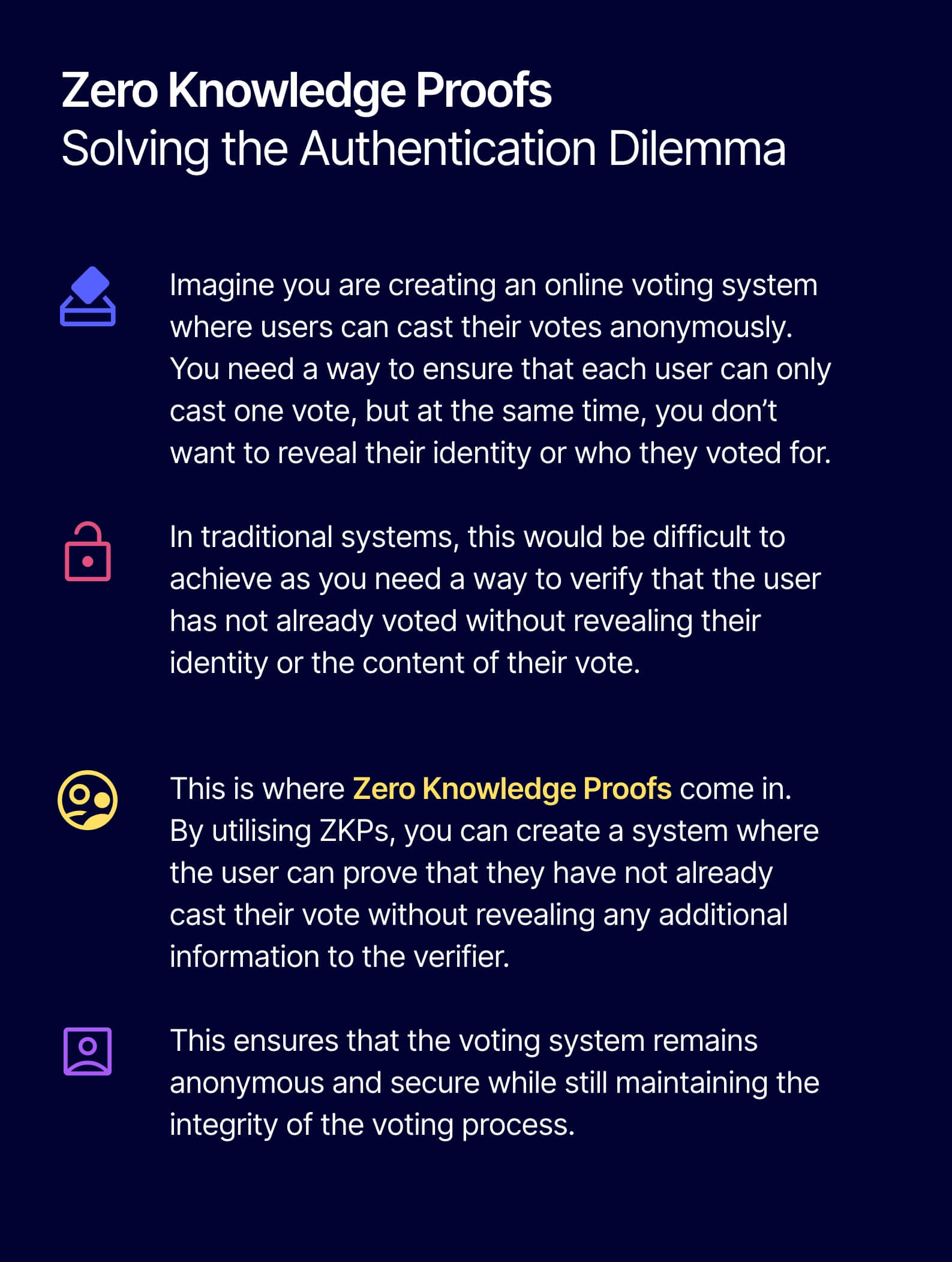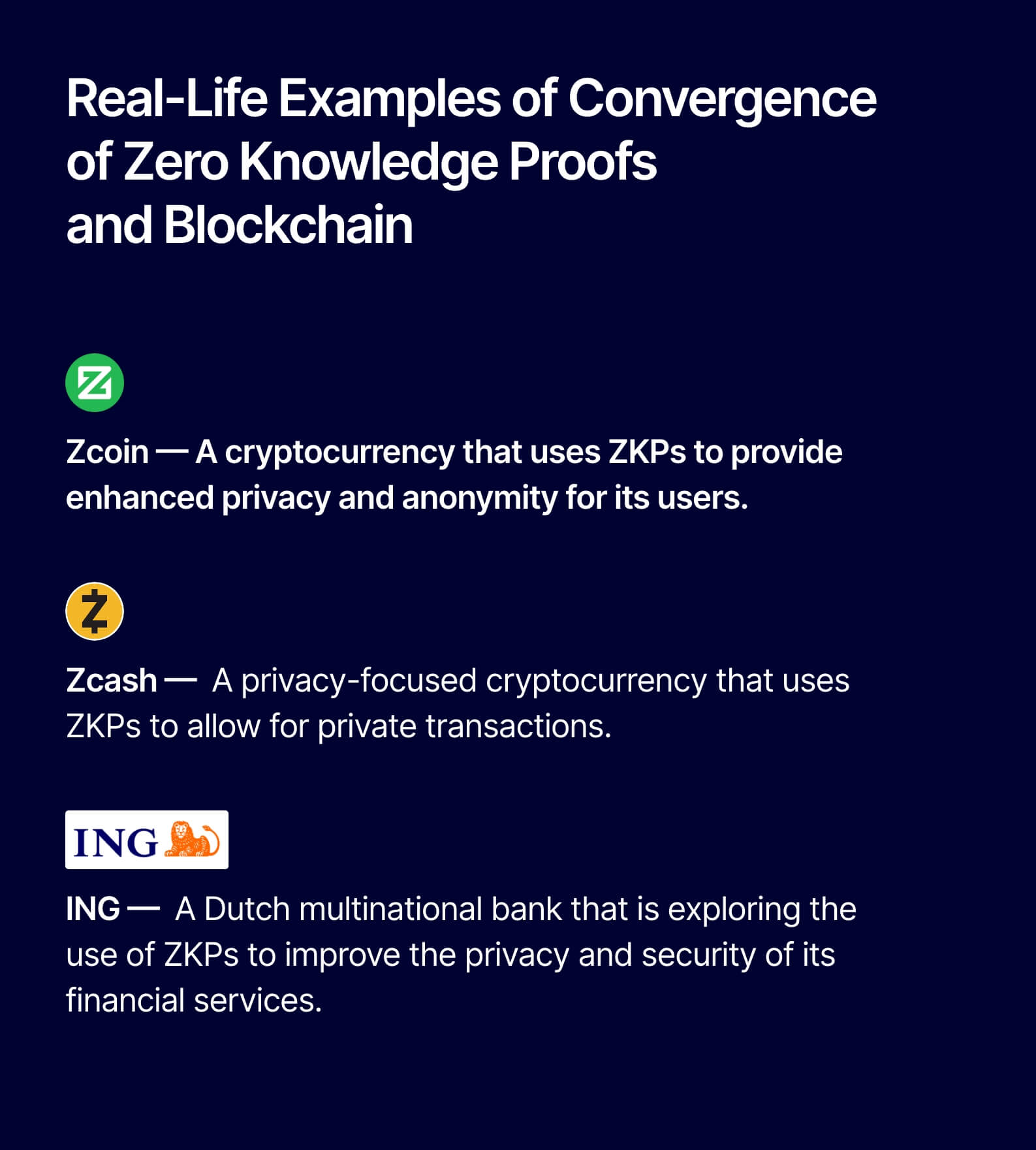SHARE THIS ARTICLE
TeSecurely Storing and Transferring Carbon Credits in the Energy Industry Using Blockchain Technology

Test
Blockchain technology has the potential to revolutionize industries beyond finance, and it is often associated with popular cryptocurrencies like Bitcoin. It operates as a decentralized and distributed ledger, enabling secure, transparent, and immutable record-keeping. However, traditional blockchains face significant challenges related to privacy and scalability.
Privacy concerns arise due to the transparent nature of blockchain transactions, while scalability issues stem from the increasing size and complexity of the blockchain. To address these challenges, Zero Knowledge Proofs (ZKPs) offer a promising solution. ZKPs allow for verifiable transactions without revealing sensitive information, and in this blog, we will delve into how ZKPs can reshape the blockchain landscape by addressing privacy and scalability concerns in traditional blockchain networks.

What are Zero Knowledge Proofs (ZKPs)?
Zero Knowledge Proofs (ZKPs) are cryptographic protocols that allow one party, known as the prover, to prove to another party, known as the verifier, that a specific statement is true without revealing any additional information about the statement. In the context of blockchain technology, ZKPs are significant as they offer solutions to the challenges of privacy and scalability.
ZK-rollups are a type of Layer 2 scaling solution that uses Zero Knowledge Proofs (ZKPs) to provide scalability and privacy benefits to blockchain transactions. ZKPs allow the prover to prove the validity of a statement without revealing any additional information, while ZK-rollups use this technology to bundle multiple transactions off-chain and verify them on-chain as a single transaction. This approach greatly reduces the computational cost and transaction fees associated with blockchain transactions while maintaining the integrity and security of the underlying blockchain network. In summary, ZK-rollups are a practical application of ZKPs that can significantly enhance the scalability and privacy of blockchain transactions.
Properties of ZKPs
-
Completeness: Zero-Knowledge Proofs (ZKPs) ensure that a valid statement can be proven to be true to the verifier. The prover can provide convincing proof that the statement is true, and the verifier can verify the proof's validity.
-
Soundness: ZKPs provide soundness, ensuring that an invalid statement cannot be proven to be true by the prover. If the statement is false, the prover will not be able to generate valid proof, and the verifier will not be convinced of its truth.
-
Zero-Knowledge: ZKPs allow for proof without revealing any additional information about the statement or the proof itself. The prover can prove the statement's truth without disclosing any knowledge or details about how the proof was generated, ensuring privacy and security in the process.
Types of ZKPs
-
Interactive Zero-Knowledge Proofs (iZKPs) is a type of proof in which the prover and verifier engage in a back-and-forth process to prove a statement. The verifier sends random challenges to the prover, who must respond with proof that satisfies the verifier's challenges. The Schnorr protocol, the Fiat-Shamir heuristic, and the Guillou-Quisquater protocol are examples of iZKPs.
-
Non-Interactive Zero-Knowledge Proofs (NIZKPs) is another type of proof that the prover generates without interaction with the verifier. The proof is then sent to the verifier for verification. NIZKPs are more efficient and faster than iZKPs as they do not require any interaction between the prover and verifier. zk-SNARKs, Bulletproofs, and STARKs are examples of NIZKPs.
1686557608412.jpg)
Advantages of ZKP Blockchains
-
Enhanced privacy and security for transactions, without compromising on transaction validation and integrity
-
Enables anonymous transactions and data sharing while maintaining privacy
-
Verifiable proof of authenticity and integrity of goods or data transfers, without revealing specific information
-
Provides a decentralized and transparent identity verification mechanism that protects user privacy
Disadvantages of ZKP Blockchains
-
High computation cost for generating and verifying proofs.
-
Complexity in implementing and integrating ZKP protocols into existing blockchain systems.
-
Limited adoption and awareness among developers and users.
-
Potential for privacy breaches or attacks if ZKP protocols are not implemented correctly.
-
Limited interoperability between different ZKP protocols and blockchain systems.
Where to Implement Zero-Knowledge Proof in Blockchain System?
-
Secure Messaging: Messaging platforms rely on end-to-end encryption to protect private communication. Currently, users must verify their identity to the server and vice-versa. However, the introduction of ZKP allows for the establishment of end-to-end trust without the exchange of additional information. As such, ZKP has become a crucial application in the blockchain industry, specifically in the field of secure messaging.
-
Anonymous Authentication: ZKPs can provide enhanced security when transmitting sensitive authentication information. By creating a secure channel that allows users to employ their information without revealing it, zero-knowledge proof can prevent data leakage in worst-case scenarios. With this approach, users can authenticate themselves without sacrificing their privacy.
-
Protecting Storage: Zero-knowledge proofs (ZKPs) can also be utilized to secure the storage of valuable data. The ZKP protocol safeguards both the storage unit and its contents, ensuring secure access channels and a seamless user experience. This way, sensitive information can remain protected and secure on the blockchain system.
-
Private Blockchain Transactions: Sending private transactions on a blockchain system requires strict security measures to prevent unauthorized access. Traditional methods may have vulnerabilities that can be exploited. By using cryptographic protocols, ZKP can enable secure and anonymous private transactions on the blockchain system, with virtually no risk of hacking or interception. This makes it an ideal solution for businesses and individuals looking to keep their sensitive information safe and secure on the blockchain

-
Streamlined Documentation: When dealing with complex documentation processes, privacy, and security are paramount. By using ZKP, users can prove the validity of a statement or document without revealing any additional information beyond what is necessary, providing a secure and streamlined approach to documentation. This has important applications in industries such as healthcare, where privacy regulations require careful handling of sensitive patient data.
-
Verified Vote Counting: The use of zero-knowledge proof in vote counting can increase trust and transparency in voting systems. By employing ZKP, voters can securely and anonymously cast their votes while ensuring the accuracy and integrity of the vote count. ZKP guarantees that only authorized individuals can participate in the voting process and that the vote results cannot be manipulated. This approach enhances voter confidence in the voting system and assures that the election outcome is free from any form of fraud or tampering.
How Zero-Knowledge Proofs are Revolutionizing Blockchain Applications
Zero-Knowledge Proofs (ZKPs) present a revolutionary solution for enhancing privacy and security in various use cases within the blockchain and web3 space. These proofs allow for the validation of data or transactions without revealing any sensitive information, which is particularly critical in applications where privacy is essential.
One of the most promising applications of ZKPs in the blockchain domain is within decentralized finance (DeFi), where anonymous transactions can be made without disclosing sensitive information about the parties involved or transaction amounts. This feature enhances users' privacy while maintaining transaction security and integrity.
In addition, ZKPs can facilitate self-sovereign identity solutions in the Web3 space, where users can verify their identity without revealing their personal data or identity documents. This implementation can enable secure and decentralized identity verification systems, which is a fundamental aspect of the decentralized web.
In essence, ZKP aims to mitigate the negative aspects of existing authentication models, such as relinquishing control of user data, vulnerability to data breaches, and unauthorized monetization of user data.
Challenges You Might Face While Integrating ZKP into Your Blockchain Project
-
Complexity and technical expertise required to implement ZKP protocols
-
Potential performance and scalability issues due to the computational overhead of ZKP calculations
-
Limited availability of ZKP libraries and tools compared to other blockchain development resources
-
Balancing privacy and transparency requirements, as increased privacy may limit the level of transparency needed for certain applications
-
Potential regulatory and legal challenges, as privacy-enhancing features may conflict with regulatory requirements in some jurisdictions.
Wrap up
To conclude, Zero-Knowledge Proofs represent a revolutionary technology that is reshaping our understanding of security, trust, and privacy in the digital world. By enabling knowledge proof without the need for data exposure, ZKPs offer a potent tool for securing sensitive information, validating transactions, and constructing secure systems. Although there are still obstacles to surmount and limitations to resolve, the potential advantages of ZKPs are evident. As more entities and programmers adopt this innovation, we can anticipate a future where privacy and security are no longer a compromise, but a basic privilege of all individuals.
Post Author

Explore Deep's insightful blog posts that help businesses stay ahead of the curve, explore new possibilities, and unlock the full potential of blockchain technology




